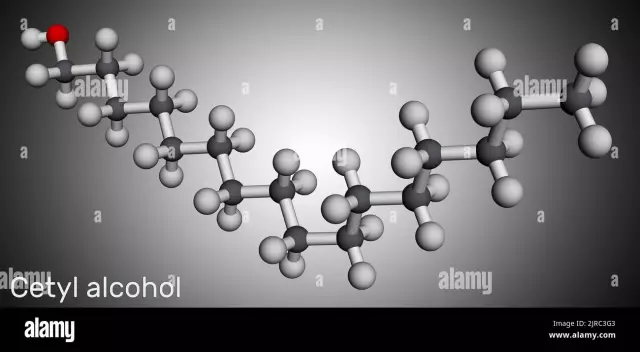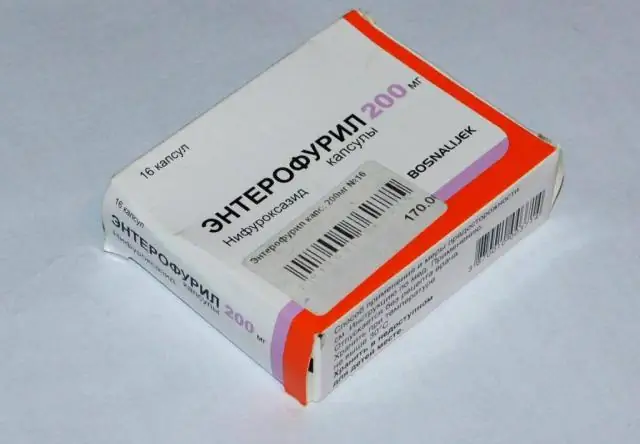- Author Rachel Wainwright [email protected].
- Public 2023-12-15 07:39.
- Last modified 2025-11-02 20:14.
Antigrippin pharmaceutical
Antigrippin pharmacy: instructions for use and reviews
- 1. Release form and composition
- 2. Pharmacological properties
- 3. Indications for use
- 4. Contraindications
- 5. Method of application and dosage
- 6. Side effects
- 7. Overdose
- 8. Special instructions
- 9. Application during pregnancy and lactation
- 10. Use in childhood
- 11. In case of impaired renal function
- 12. For violations of liver function
- 13. Drug interactions
- 14. Analogs
- 15. Terms and conditions of storage
- 16. Vacation conditions
- 17. Reviews
- 18. Price in pharmacies
Latin name: Antigrippin pharmaceutical
ATX code: R05X
Active ingredient: capsule A - ascorbic acid (Acidum ascorbinicum), acetylsalicylic acid (Acidum acetylsalicylicum), rutoside (Rutosidum); capsule B - metamizole sodium monohydrate, diphenhydramine hydrochloride, calcium gluconate monohydrate
Producer: NPO FarmVILAR, LLC (Russia)
Description and photo update: 2019-10-07

Antigrippin pharmacy is a combined drug for the treatment of symptoms of colds, acute respiratory viral infections (ARVI) and influenza.
Release form and composition
The preparation is produced in the form of capsules: hard gelatinous, size No. 0, two types; capsules A - green, contents - a mixture of amorphous and crystalline powder from pale yellow to yellow with a green tint, with the possible presence of lumps and single inclusions of a darker color; capsules B - white, contents - a mixture of granules and powder of white or white with a yellow tint, with the possible presence of lumps (capsules A - 10 pcs. in a contour cell package, capsules B - 10 pcs. in a contour cell package; c cardboard box 1 package with capsules A, 1 package with capsules B and instructions for use of Antigrippin Pharmaceutical).
1 capsule A contains:
- active ingredients: ascorbic acid - 300 mg, acetylsalicylic acid - 250 mg, rutoside (in the form of trihydrate) - 20 mg;
- additional components: potato starch, calcium stearate;
- capsule shell: gelatin, titanium dioxide (E171), brilliant black dye (E151), brilliant blue dye (E133) or proprietary blue dye (E131), azorubin dye (E122), quinoline yellow dye (E104).
1 capsule B contains:
- active ingredients: metamizole sodium monohydrate - 250 mg, calcium gluconate monohydrate - 100 mg, diphenhydramine hydrochloride - 20 mg;
- additional components: potato starch, calcium stearate;
- capsule shell: titanium dioxide (E171), gelatin.
Pharmacological properties
Pharmacodynamics
Antigrippin pharmaceutical is a combined preparation of anti-inflammatory, antipyretic, analgesic, anti-congestive and angioprotective action. The pharmacological activity of the medicinal product is due to the properties of the active substances included in its composition:
- ascorbic acid: participates in many redox reactions in the body, helps to slow down the processes of peroxidation of proteins, lipids and other cell components, ensuring its protection from damage; leads to an increase in the level of interferon in the blood, the result of which is a membrane stabilizing and immunomodulatory effect; acid has the ability to accumulate in leukocytes, increasing their phagocytic activity, thereby enhancing protection against pathogenic microbes and viruses; activating the course of the biosynthesis of corticoid hormones in the adrenal cortex, induces adaptation processes in the body under stress;
- acetylsalicylic acid: inhibits anti-inflammatory factors, exudative and proliferative stages of inflammation as a result of suppression of cyclooxygenase (COX), blocks the production of inflammatory mediators or inactivates the latter; demonstrates antipyretic, analgesic and anti-inflammatory effects, slows down platelet aggregation;
- rutoside: belongs to the group of bioflavonoids that can be used as structural components of biologically important cellular compounds, in particular, ubiquinone; possesses angioprotective properties, helps to reduce capillary bleeding due to strengthening and increasing the elasticity of the walls of blood vessels, the permeability of which increases during a viral infection; helps to maintain a normal level of functioning of the immune system;
- diphenhydramine: refers to competitive blockers of histamine H 1 receptors, demonstrates pronounced antihistamine activity - reduces the response to endogenous and exogenous histamine; exhibits a local anesthetic effect, due to direct antispasmodic effect relaxes smooth muscles, moderately blocks cholinergic receptors of autonomic nerve nodes; reduces capillary permeability, prevents the development of hypotension and tissue edema; reducing vascular permeability, helps to eliminate swelling and hyperemia of the nasal mucosa, sore throat, allergic reactions from the upper respiratory tract; has a sedative effect;
- calcium gluconate: contains calcium ions, the presence of which is extremely important for the transmission of nerve impulses, as well as for the normal activity of the myocardium, bone formation, contraction of smooth and skeletal muscles, hemocoagulation; calcium ions reduce the permeability of the walls of blood vessels and cells, prevent the development of inflammatory reactions, increase resistance to infectious agents;
- metamizole sodium: refers to analgesic non-narcotic drugs, pyrazolone derivatives; non-selectively inhibits COX and reduces the production of prostaglandins from arachidonic acid; does not allow pain impulses, helps to increase the excitability threshold of thalamic centers of pain sensitivity, increase heat transfer; has antipyretic, analgesic and somewhat antispasmodic (in relation to the smooth muscles of the biliary and urinary tract) action.
Indications for use
Antigrippin pharmaceutical is recommended for symptomatic treatment of colds, acute respiratory viral infections and influenza, occurring with chills, headache, fever, nasal congestion.
Contraindications
Absolute:
- gastrointestinal bleeding;
- erosive and ulcerative lesions of the gastrointestinal tract (GIT) in the acute phase;
- portal hypertension;
- dissecting aortic aneurysm;
- predisposition to bleeding;
- hereditary hemolytic anemia, including caused by a deficiency of glucose-6-phosphate dehydrogenase;
- oppression of hematopoiesis (neutropenia, agranulocytosis, leukopenia);
- hemorrhagic diathesis (von Willebrand disease, hemophilia, telangiectasia, thrombocytopenia, hypoprothrombinemia, thrombocytopenic purpura);
- vitamin K deficiency;
- severe functional disorders of the liver / kidneys;
- bronchial asthma and diseases accompanied by bronchospasm (including aspirin asthma);
- nephrolithiasis (calcium);
- hypercalcemia (the content of calcium ions should not be higher than 12 mg% or 6 mEq / l);
- sarcoidosis;
- calciuria;
- deficiency of glucose-6-phosphate dehydrogenase;
- age up to 18 years;
- pregnancy and lactation;
- combination therapy with cardiac glycosides (the threat of arrhythmias);
- hypersensitivity to the constituents of the product.
Relative (it is necessary to use capsules of Antigrippin Pharmaceutical with extreme caution):
- decompensated heart failure;
- peptic ulcer and / or duodenal ulcer (history);
- gout;
- urate nephrolithiasis;
- hyperuricemia.
Antigrippin pharmaceutical, instructions for use: method and dosage
Pharmaceutical Antigrippin is taken orally 2-3 times a day for 3-5 days until the symptoms of the lesion disappear. The capsules should be taken after meals with water.
It is recommended to use 2 capsules for 1 reception - 1 green from blister A and 1 white from blister B.
If after a five-day course of therapy there is no improvement in well-being, it is necessary to stop using the product and consult a doctor.
Side effects
Adverse reactions from systems and organs:
- urinary system: renal failure;
- cardiovascular system: tachycardia, increased blood pressure (BP);
- allergic reactions: skin rash, bronchospasm, Quincke's edema;
- digestive system: nausea, diarrhea, vomiting, anorexia, gastralgia, gastrointestinal bleeding, erosive and ulcerative gastrointestinal defects, liver failure.
Violations recorded against the background of long-term drug treatment (over 7 days):
- hematopoietic system: thrombocytopenia, leukopenia, agranulocytosis;
- central nervous system: headache, dizziness;
- respiratory system: with a predisposition to bronchospasm, the provoking of an attack is aggravated;
- sense organs: tinnitus, deafness, visual impairment;
- blood coagulation system: hypocoagulation, decreased platelet aggregation, hemorrhagic syndrome (including bleeding gums, epistaxis, purpura);
- allergic reactions: Stevens-Johnson syndrome, anaphylactic shock, toxic epidermal necrolysis (Lyell's syndrome);
- urinary system: urine staining red as a result of excretion of the metabolite, impaired renal function, proteinuria, anuria, oliguria, interstitial nephritis, kidney damage with papillary necrosis;
- others: Reye's syndrome (vomiting, metabolic acidosis, hyperpyrexia, liver functional disorders, disorders of the nervous system, psyche).
Overdose
Symptoms of an Antigrippin drug overdose may include pallor of the skin, sweating, nausea, stomach pain, vomiting, tachycardia. Against the background of mild intoxication, ringing in the ears may occur; in severe overdose - drowsiness, bronchospasm, convulsions, anuria, shortness of breath, bleeding, collapse, uncoupling of oxidative phosphorylation and progressive respiratory paralysis, leading to respiratory acidosis. In case of suspicion of poisoning, you must immediately seek emergency medical help.
In this condition, it is recommended to induce vomiting, rinse the stomach, take activated charcoal, saline laxatives. In a hospital, forced diuresis, hemodialysis are performed, when a convulsive syndrome appears, barbiturates and diazepam are administered intravenously.
special instructions
If the patient requires surgery, the doctor must be informed in advance about taking Antigrippin Pharmaceuticals, since one of its active components is acetylsalicylic acid, which has an antiaggregatory effect.
In low doses, acetylsalicylic acid reduces the excretion of uric acid, which under certain circumstances can lead to the development of a gout attack.
Due to the stimulating effect of ascorbic acid on the production of corticosteroid hormones, during the use of Pharmaceutical Antigrippin, it is necessary to monitor renal function and blood pressure.
If patients have rapidly proliferating and intensively metastatic tumors, the use of ascorbic acid can provoke a deterioration in the course of the process.
During the period of therapy, due to the aggravation of the risk of gastrointestinal bleeding, it is necessary to refrain from drinking ethanol-containing drinks.
Patients with bronchial asthma and pollinosis when using Antigrippin Pharmaceutical should take into account the likelihood of developing hypersensitivity reactions.
Since ascorbic acid can act as a reducing agent, it can distort the results of various laboratory tests, including blood levels of bilirubin, glucose, lactate dehydrogenase (LDH) activity and hepatic transaminases.
Influence on the ability to drive vehicles and complex mechanisms
Caution should be exercised during the course of treatment for patients driving a car and other complex moving mechanisms.
Application during pregnancy and lactation
The use of the drug in pregnant women is contraindicated.
In the case when taking Antigrippin pharmacist during lactation is absolutely necessary, the issue of transferring the child to artificial feeding should be resolved.
Pediatric use
The use of Antigrippin pharmaceutical capsules in children and adolescents under 18 years of age is contraindicated.
With impaired renal function
Patients with severe impairment of kidney function, calcium nephrolithiasis, drug therapy is contraindicated.
With urate nephrolithiasis, Antigrippin is prescribed with caution.
For violations of liver function
Treatment with the drug is contraindicated in patients with severe hepatic impairment, portal hypertension.
Drug interactions
- oral anticoagulants, heparin, reserpine, hypoglycemic agents, steroid hormones: the effectiveness of these agents increases;
- antihypertensive drugs, spironolactone, furosemide, uricosuric drugs (drugs that promote the excretion of uric acid): their effect is weakened;
- glucocorticosteroids, non-steroidal anti-inflammatory drugs, sulfonylurea derivatives, non-narcotic analgesics, methotrexate: their side effects are aggravated;
- antiepileptic drugs, barbiturates, ethanol-containing drugs, rifampicin, zidovudine: the threat of hepatotoxic action increases, such combined treatment should be avoided;
- alcoholic beverages: their effects are enhanced under the influence of sodium metamizole;
- melphalan and thiamazole: the risk of leukopenia is aggravated when used in combination with metamizole sodium;
- iron preparations: their absorption in the intestine improves when taken simultaneously with ascorbic acid;
- allopurinol, oral contraceptives, tricyclic antidepressants: the biotransformation of metamizole in the liver is disturbed and its toxicity increases;
- cyclosporine: its plasma concentration in the blood decreases;
- tranquilizers, sedatives: the analgesic effect of metamizole sodium increases;
- colloidal blood substitutes, radiopaque substances, penicillin: it is not recommended to use these funds during treatment with metamizole sodium.
Analogs
The analogues of Antigrippin pharmaceutical are Antigrippin-Anvi, Dr. AntiFlu in the season of colds, Antigrippin, Antigrippin-ARVI, etc.
Terms and conditions of storage
Store out of reach of children, protected from moisture and sunlight, at a temperature not exceeding 25 ° C.
Shelf life is 2 years.
Terms of dispensing from pharmacies
Available without a prescription.
Reviews about Antigrippin Pharmaceutical
The reviews on Antigrippin Pharmaceuticals found on medical and specialized sites in most cases indicate the effectiveness of the drug in the symptomatic treatment of colds, flu and SARS. Patients note that after two to three days of admission, body temperature normalizes, headache, sore throat, and mild nasal congestion are eliminated. In the opinion of some patients, Antigrippin pharmacy significantly improves overall well-being already on the first day of treatment.
The disadvantages of the drug, many refer to the development of severe drowsiness against the background of its administration.
The price of Antigrippin pharmacy in pharmacies
There is no reliable information about the price of Antigrippin Pharmacy, since at the moment the drug is not available for sale in the pharmacy network.

Anna Kozlova Medical journalist About the author
Education: Rostov State Medical University, specialty "General Medicine".
Information about the drug is generalized, provided for informational purposes only and does not replace the official instructions. Self-medication is hazardous to health!






